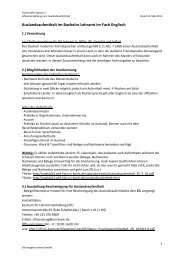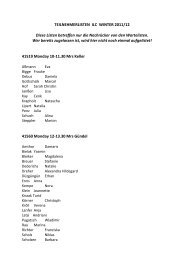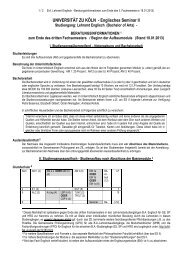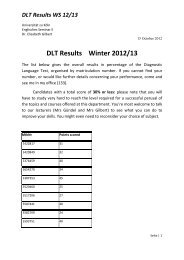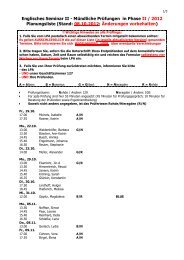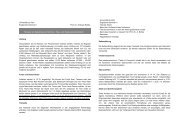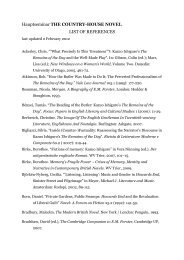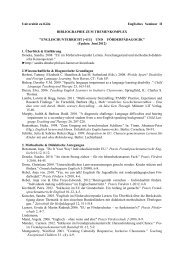STUDENT SCRIPT - Englisches Seminar II - Universität zu Köln
STUDENT SCRIPT - Englisches Seminar II - Universität zu Köln
STUDENT SCRIPT - Englisches Seminar II - Universität zu Köln
You also want an ePaper? Increase the reach of your titles
YUMPU automatically turns print PDFs into web optimized ePapers that Google loves.
1.2 1.2 Poetry: Elementaries of Rhyme<br />
Nieragden: ILCS 13<br />
1. RHYME TYPES<br />
1.1. Pure rhyme [REINER REIM]<br />
Words with perfect identity of sound in stressed syllables. It is also known as perfect rhyme.<br />
“Two roads diverged in a yellow wood ood ood, ood end rhyme [ENDREIM]<br />
And sorry that I could not travel both,<br />
And be one traveler, long I stood ood ood<br />
And looked down as far as I could ould ould” ould<br />
(Robert Frost, “The Road Not Taken”)<br />
“I am the daughter aughter of Earth and Water ater ater, ater internal rhyme [BINNENREIM]<br />
And the nursling of the Sky;<br />
I pass through the pores ores of the ocean and shores ores ores” ores (Percy B. Shelley, “The Cloud”)<br />
“Then all averred, I had killed the bird identical rhyme [IDENTISCHER REIM]<br />
That brought the fog and mist mist. mist<br />
‘Twas right, said they, such birds to stay,<br />
That bring the fog and mist mist” mist<br />
(Samuel Coleridge, “The Rime of the Ancient Mariner”)<br />
1.2 Imperfect Rhyme [UNECHTER REIM]<br />
Alliteration [ALLITERATION]<br />
The repetition of a consonant at the beginning of neighbouring words (= initial half rhyme).<br />
“Five miles meandering with a mazy motion” (Samuel Coleridge, “Kubla Khan”)<br />
“Do not go gentle into that good night” (Dylan Thomas, “Do Not Go Gentle Into That Good Night”)<br />
Assonance [ASSONANZ]<br />
The repetition of a vowel at the beginning or in stressed syllables of neighbouring words (= half<br />
rhyme).<br />
“A miner on the dole,<br />
with nowhere to go” (Bryn Griffiths, “On the Dole”)<br />
“twice five miles of fertile ground” (Samuel Coleridge, “Kubla Khan”)<br />
Consonance [KONSONANZ]<br />
The repetition of the same conso consonant conso<br />
nant before and/or after differing stressed vowels<br />
“It seemed that out of battle I esc sc scaped sc<br />
Down some profound dull tunnel, long since sc scooped sc<br />
Through granites which titanic wars had gr groined. gr<br />
Yet also there encumbered sleepers gr groaned” gr (Wilfried Owen, “Strange Meeting”)<br />
Assonance, alliteration and consonance are very frequent in idioms (‘as dead as a doornail’; ‘cold as<br />
a stone’), advertising (‘Guinness is good for you’; ‘fish n’ chips’; ‘Beanz nz meanz nz Heinz nz nz’), nz tongue twisters<br />
(‘Peter Piper picked a peck of pickled pepper’; ‘Round the rugged rock the ragged rascal ran’),<br />
and onomatopoetic language (‘kn kn knick kn ck ck-kn ck kn knack kn ck ck’). ck<br />
Eye Rhyme [AUGENREIM]<br />
Words which look like a pure rhyme, but only have identical spellings, not identical sounds (e.g.<br />
great/meat; find/wind).<br />
“Dull would he be of soul who could pass by<br />
A sight so touching in its majesty ty ty” ty<br />
(William Wordsworth, “Composed Upon Westminster Bridge)<br />
“Strong gongs groaning as the guns boom far ar ar, ar<br />
Don John is going to war ar ar” ar<br />
(Gilbert K. Chesterton, “Lepanto”)



